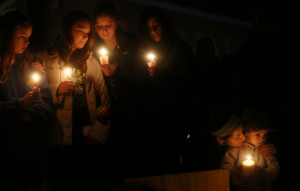I don’t know which is worse. Theists on the right who push their self-projected image of Jesus to promote consumerism and corporatism, or atheists on the left who deny the spiritual dimension altogether in favor of “cold-blooded reason.” Two sides of the same debased coin at Christmastime 2012.
 Jesus was a great teacher, and we cannot hold the fact that he was nailed to a cross, and his followers invented a religion that’s brought the West and the world to this pass, against him.
Jesus was a great teacher, and we cannot hold the fact that he was nailed to a cross, and his followers invented a religion that’s brought the West and the world to this pass, against him.
Jesus didn’t know he was going to die anymore than he knew was going to be born. Christians believe he knew he was going to ‘die on the cross for our sins’ during the short period he taught. That’s nonsense. They project an infinite intelligence into Jesus. But Jesus wasn’t God, whatever God is; he was a man for Chrissakes.
People on the left who see no difference between young children getting shot multiple times in a classroom and the innumerable other mass shootings in the USA, who insist that it’s merely “the latest in a string of similar events involving widely available deadly weapons often in the hands of mentally ill people,” have no heart themselves.
With absurdly unintended irony, the same people say “weeping for the murdered children like they’re our own is partly ridiculous, and partly obscene,” and declare that “what’s needed now isn’t warmhearted empathy; it’s cold-blooded reason.”
To all the heartless idiots that take such a view, it’s exactly “cold-blooded reason” that sociologically and psychologically (you can reverse the order if you like) produces unfeeling cretins. The knee-jerk reaction on the left is to focus solely on a nation awash in assault rifles and semi-automatic handguns, with many righteously proclaiming the underlying cause to be “the cold calculations of profit and politics.”
The answer isn’t the flip side of the secular/religious coin that so many mediocrities on both sides toss. There is no answer, just the response of feeling, understanding, and insight. Of course that involves feeling shared pain, rather than superior analysis.
“And some people were bringing children to him, for him to bless; but the disciples rebuked them. And when Jesus saw this, he was indignant, and said to them, ‘Let the children come to me, don’t try to stop them, for the kingdom of God belongs to such as these. Truly I tell you, whoever doesn’t accept the kingdom of God like a child cannot enter it.’ And he took them into his arms, and put his hands on them, and blessed them.”
this, he was indignant, and said to them, ‘Let the children come to me, don’t try to stop them, for the kingdom of God belongs to such as these. Truly I tell you, whoever doesn’t accept the kingdom of God like a child cannot enter it.’ And he took them into his arms, and put his hands on them, and blessed them.”
It takes a very jaded person not to be moved by these words this Christmas. Yes, it’s fair for thinking people to ask, ‘Where did Christianity go wrong?’ And it’s fair for them to reply that it went wrong when the ‘Jesus Movement’ within Judaism morphed onto Christianity in the decades and centuries after Jesus’ crucifixion. Which is to say, Christianity went wrong when it became Christianity.
But it takes a certain kind of callousness to invoke the charge of sentimentality about people grieving over the slaughter of young children by saying, “we’ve now had so many gun-related blood baths in this country that we’re into reruns.” Such an absence of affect is less than six degrees from the void in the gunman himself.
As I write this, it’s is the winter solstice in the northern hemisphere, the predicted and much awaited and even hoped for end of the world.
 A few employees at the local brewery, evincing some fear as the predicted time neared on their graveyard shift, were overheard to say, “Don’t mess around with this Mayan stuff.” To which another worker muttered, “If the Mayans were so smart, why didn’t they foresee their own extinction?” Indeed.
A few employees at the local brewery, evincing some fear as the predicted time neared on their graveyard shift, were overheard to say, “Don’t mess around with this Mayan stuff.” To which another worker muttered, “If the Mayans were so smart, why didn’t they foresee their own extinction?” Indeed.
Did the world end? Obviously not physically, but apparently so metaphysically.
If you see life and the human brain in terms of randomness and mechanistic natural selection, with no greater potential in human beings than for rationality and ever-increasing scientific knowledge, then there’s no kernel of truth in any of this apocalyptic backwash.
But if you feel that there must be something more than materialism, mechanism, and the mundane, and yet have too many active brain cells to settle on scriptural stories meant for humankind’s childhood, or apocalyptic entertainment meant for the masses, the metaphor of the end of the world becomes a deeper question.
Since all societies and ages have their deaths, just as they have had their births, what is this ‘end of the world’ so many people have been carrying on about?
It isn’t merely ‘The American Century,’ or Western Civilization, or the Industrial Revolution, but rather hundreds of thousands of years of human consciousness as we’ve known it. Thought may go on as a rump principle in dead people and peoples, but no one believes in man anymore, except in a cynically scientific and technological way, since the tradition and culture have ceased to hold cohesive power anywhere.
Living individuals who refuse to quit on humanity are all that’s left now, adrift on floating islands of deadness and debris. Fewer and fewer atolls of life poke up through the rising tide, which is wiping out human spirits as certainly as it is wiping out animal species.
Sure, there are outposts of the vibrant earth and cultures that all peoples once knew. But tourist hoards are flocking to these shrinking natural and human habitats in the hope of finding some life, and having it restored in themselves. They bring only their deadness however, spreading it like a virus, because the dead have refused, until now, to stand still and face the fact, so that they can return to life.
In the end there is only the only primeval imperative: Radically change or perish. The world has ended; long live humanity.
Martin LeFevre

